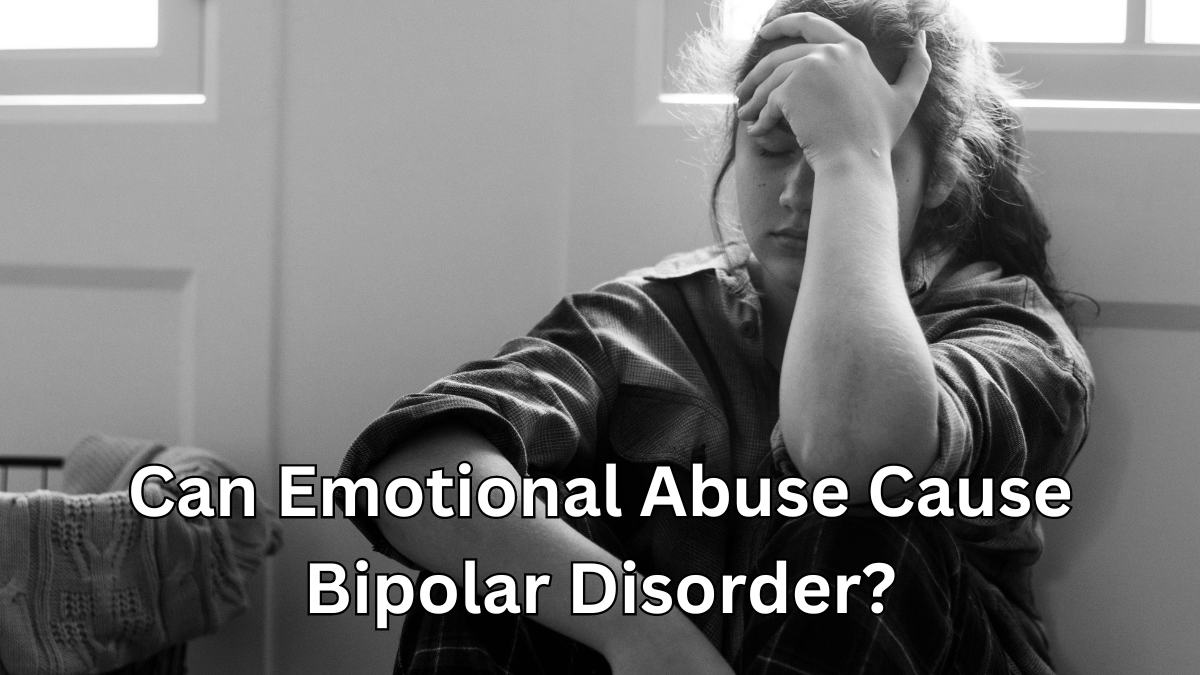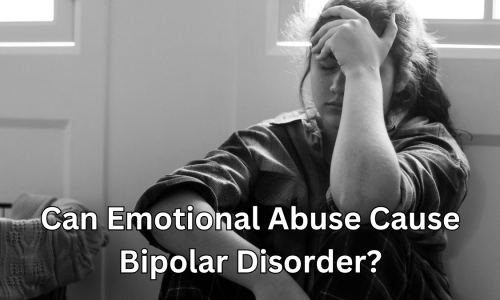Bipolar disorder is more than just mood changes. It’s a serious mental health condition affecting millions globally. In this article, we explore a crucial question: Can emotional abuse cause bipolar disorder? Recent studies suggest a complex link between prolonged emotional trauma and mental health disorders, including bipolar disorder.
Our aim is to provide clear, straightforward information. We’ll cover what bipolar disorder is, its potential connection to emotional abuse, and its various causes. This article is designed for anyone looking to understand this condition better, whether for personal knowledge or to support someone else.
Table of Contents
ToggleWhat Is Bipolar Disorder Like?
Bipolar disorder is a mental health issue where a person’s mood changes a lot. These mood changes are really big. When someone has bipolar disorder, they have times when they feel super happy or full of energy, which is called mania. Other times, they feel very sad or have no energy, which is called depression.
These mood changes are more than just normal ups and downs. They can be strong and happen a lot. They can make it hard for someone to do their usual stuff like going to school or hanging out with friends. It’s different for each person. Some people with bipolar disorder might feel these mood changes many times a year, and others less often.
It’s important to know about bipolar disorder because it’s common. In the U.S., about 3 out of every 100 adults have it. It’s not just in the U.S. but all over the world. If someone knows they have it early, they can get help to feel better. That’s why understanding bipolar disorder really matters.
Is Bipolar Disorder Linked to Abuse?
A big question people ask is whether bad experiences, like being emotionally abused, can lead to bipolar disorder. Emotional abuse means being treated in a way that hurts your feelings really badly, often over a long time. It’s a serious issue and can deeply affect someone’s mental health.
Research shows that there might be a link between emotional abuse and bipolar disorder. People who have had a lot of emotional pain, especially as kids, might be more likely to get bipolar disorder. But, it’s important to remember that it’s not the only reason someone might get it. Bipolar disorder can happen for many reasons, and emotional abuse is just one of them.
It’s also key to know that not everyone who faces emotional abuse will get bipolar disorder. Everyone is different, and how they react to hard situations can vary a lot. Some might get other mental health issues, or none at all.
So, while there might be a connection, it’s a complex one. It’s not as simple as saying emotional abuse always leads to bipolar disorder. But understanding this possible link is important, especially for helping people who have had tough experiences.
Does Emotional Abuse Cause Bipolar Disorder?
Bipolar disorder happens because of different things coming together. Let’s talk about what some of these things are:
Family History and Bipolar Disorder
Having a family member with bipolar disorder can increase your chances of having it too. This is because some health conditions, including bipolar disorder, can be passed down in families, just like physical traits. It’s not a sure thing, though. Just because your mom or dad has bipolar disorder doesn’t mean you’ll definitely get it. It’s more like a possibility. Think of it as a health trait that runs in families, similar to how some families have a history of high blood pressure or diabetes.
Brain Structure and Function in Bipolar Disorder
Our brain controls how we feel, think, and act. In people with bipolar disorder, their brains might work a bit differently than those who don’t have the disorder. Scientists use special machines to look at brains and see how they’re different in people with bipolar disorder.
They’ve noticed some changes in the parts of the brain that control emotions, thinking, and sleep. It’s a bit like having a car where the engine runs differently. Understanding these brain differences helps doctors figure out better treatments.
Life Events Leading to Bipolar Disorder
Tough or stressful life events can sometimes trigger bipolar disorder, especially if you’re already at risk because of your family history or brain structure. These events can be things like losing someone very close to you, getting divorced, or losing a job. It’s like these events hit a “start” button for bipolar disorder in some people. Not everyone who goes through hard times will get bipolar disorder, but for some, these events can start the symptoms.
Substance Use and Bipolar Disorder
Using drugs or drinking a lot of alcohol, especially at a young age, can increase the risk of developing bipolar disorder. Substances like these can change the way the brain works and develops. Think of it like putting the wrong type of fuel in a car; it can make the car run badly or even damage it. For young people, whose brains are still developing, using drugs or alcohol can be particularly risky.
Childhood Trauma and Bipolar Disorder
Having really hard experiences as a child, like being emotionally or physically abused, can affect a person’s chance of getting bipolar disorder later in life. This trauma can have a big impact on how a child’s brain develops. It’s like putting a lot of stress on a growing plant. The plant might grow, but it could be different from what it would have been without that stress. Not all children who experience trauma will develop bipolar disorder, but it can be one of the factors that increase the risk.
Prevention of Emotional Abuse and Bipolar Disorder
Preventing emotional abuse is a big step in reducing the risk of bipolar disorder and other mental health issues. Emotional abuse can deeply hurt someone’s feelings and affect their mental health. It includes things like constantly criticizing, ignoring, or bullying someone. Stopping this kind of abuse can help lower the chances of developing mental health problems like bipolar disorder.
Education and Awareness: Teaching people about what emotional abuse is and why it’s harmful is crucial. Schools, communities, and families can all play a part in this. When people know how to spot and stop emotional abuse, they can protect themselves and others.
Supportive Environments: Creating safe spaces where people feel valued and respected can prevent emotional abuse. This includes homes, schools, and workplaces. It’s about building a community where everyone looks out for each other.
Counseling and Therapy: For those who have been through emotional abuse or are at risk of abusing others, counseling can be really helpful. It’s a way for people to work through their feelings and learn healthier ways to deal with problems.
Policies and Laws: Having strong laws and policies against emotional abuse is important. This helps to protect people and shows that emotional abuse is taken seriously.
Conclusion
Emotional abuse, which is when someone is treated really badly over a long time, can be one of these things. But it doesn’t mean that if someone is emotionally abused, they will definitely get bipolar disorder. It’s just one of the many factors that can play a part.
Getting help early for bipolar disorder is really important. It can help people manage their condition and live better lives. This help can be from doctors, therapy, and support from family and friends.
Finally, it’s good to be kind and understanding to people with bipolar disorder. They are going through a lot, and our support can help them a lot. The more we know about bipolar disorder, the better we can help those who have it.











1 Comment
Very interesting subject, thanks for posting.Blog range
Your comment is awaiting moderation.
[…] Can Emotional Abuse Cause Bipolar Disorder? […]
Your comment is awaiting moderation.
[…] Can Emotional Abuse Cause Bipolar Disorder? […]